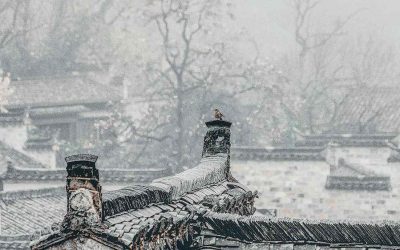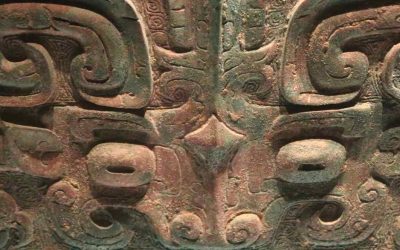The Wenzi Begins: Echoes from a Forgotten Taoist Voice
The Wenzi (文子) is an ancient Daoist text attributed to a disciple of Laozi. Although its authenticity has been debated throughout history, its content clearly reflects the Daoist worldview and its influence on the natural order, politics, and everyday life. This opening passage of the work, deeply poetic and philosophical, expresses the ineffable nature of the Dao and its power to generate and harmonize all aspects of the universe. Through imagery evoking primordial chaos, non-action, and the unity of opposites, the text invites an intuitive and vital understanding of the world. Here we present a modern translation intended for contemporary readers.
Laozi said:
“There is a thing, born from chaos, before Heaven and Earth. It has the semblance of form but no shape. Deep, dark, silent, still, without sound. I force myself to give it a name: I call it Dao.
Dao is so high it cannot be reached, so deep it cannot be fathomed. It enfolds Heaven and Earth, receives form from the formless, flows endlessly yet never fills. Murky, it slowly clears through stillness. It can be applied without end, without regard to morning or evening.
Its appearance does not fill a handful, but when constrained, it stretches; when hidden, it shines; when soft, it becomes strong. It contains the yin and exhales the yang, and from it emerge the three celestial lights.
Mountains are tall because of it, abysses deep because of it, beasts run, birds fly, the qilin roams and the phoenix soars, and the stars and the calendar move by its law. From death it draws life, from lowliness it takes nobility, from withdrawal it brings precedence.
In ancient times, the Three Emperors attained the unity of Dao and stood at the center. Their spirit moved and transformed, embracing all directions. Thus, they moved with Heaven and Earth in perfect harmony: cycles turned without end, waters flowed without rest, things were joined from beginning to end. Wind stirred, clouds rose, thunder sounded, and rain fell — all responding without exhaustion. All that is carved and polished returns to simplicity.
To act without acting aligns with life and death. To speak without striving leads to virtue. Serenity and joy without pride bring harmony. A thousand differences all find their ease in life.
Dao harmonizes yin and yang, regulates the four seasons, balances the five elements, nourishes grasses and trees, seeps into metals and stones. Birds and beasts grow great, their hair and feathers glossy. Bird eggs do not rot, beast embryos do not die. Fathers do not mourn sons, brothers do not grieve for brothers. Children are not orphaned, women are not widowed. No rainbows are seen, no thieves appear. These are the fruits of virtue.
The Way of the Great Constant brings forth all things without possessing them, completes their transformation without controlling them. All beings rely on it to live, yet do not know its virtue. They rely on it to die, yet cannot resent it. What is stored and accumulated does not lead to wealth. What is given and received does not lead to poverty.
Suddenly, indistinctly, it cannot be represented. Faintly, swiftly, it is inexhaustible in use. Deep and obscure, it responds to transformation without form. It moves forth, it flows freely, never moves in vain. It embraces both firm and yielding, rises and bows with yin and yang.”
Original text: https://ctext.org/wenzi/dao-yuan
About me: I have spent 30 years in China, much of the time traveling and studying this country’s culture. My most popular research focuses on Chinese characters (Chinese Characters: An Easy Learning Method Based on Their Etymology and Evolution), Matriarchy in China (there is a book with this title), and minority cultures (The Naxi of Southwest China). In my travels, I have specialized in Yunnan, Tibet, the Silk Road, and other lesser-known places. Feel free to write to me if you’re planning a trip to China. The agency I collaborate with offers excellent service at an unbeatable price. You’ll find my email below.
Last posts
Caractères chinois – le livre
Caractères chinois - le livre Ce livre est consacré à révéler à l'étudiant occidental le "mystère" des caractères chinois, rendre leur apprentissage simple, fournir les clés pour entrevoir le sens et la prononciation des caractères inconnus. Pour ce faire, nous allons...
10 activities not to be missed in Jianshui
10 activities not to be missed in Jianshui Sleeping in an old hotel. Not only does the city boast a number of ancient areas, but in recent years the local government assisted in the restoration of 10 hotels in old houses, making Jianshui an ideal place to immerse...
Yan Lianke. The Four Books
Yan Lianke. The Four Books The Four Books refers to the famous Four Books of Confucius, the basis of Chinese thought for two millennia. And like those of Confucius, these by Yan Lianke could become a new model for understanding the glories and miseries of human...
Zhang Yimou brings spy movies to the limelight in China
Zhang Yimou brings spy movies to the limelight in China In short: a film that should not be missed by any fan of Chinese cinema or culture, but without great ideological ambitions. Nevertheless, the heroism of some people who risked everything in pursuit of ideals is...
What if China’s history had been precipitated by the eruption of a volcano in Greece?
What if China's history had been precipitated by the eruption of a volcano in Greece? Although in present times there is greater concern about global phenomena, it is not that they did not happen before. Some natural catastrophes in the past were so violent that they...
Lao She Cat Country
Cat Country - Lao She Sometimes we say that a poet or a writer writes with his blood, and there are many occasions in which writers end up paying with their lives for having written a book. This is possibly one of them, and we can say that Lao She paid with his life...










